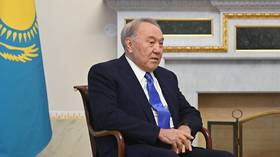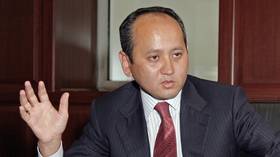Kazakh ex-president resurfaces in bid to quell coup fears

Nursultan Nazarbayev, the former president of Kazakhstan, has published a video statement, speaking for the first time about the mass unrest that shook the country earlier this month and denying claims that there has been a power struggle among the nation’s elite.
The 81-year-old released the clip on Tuesday. He rejected rumors that he had fled the country, saying he continues to reside in the capital.
“There is no conflict or confrontation within the elite,” the former president said, seated alone at a desk in front of Kazakh flags. “Rumors to this effect are absolutely groundless.”
Nazarbayev emphasized that he had handed over power to the current president, Kassym-Jomart Tokayev, when he left office in 2019, and said he had been living as a “pensioner” since then.
However, Tokayev is generally considered to be Nazarbayev’s hand-picked successor. Many analysts have speculated that he retained a grip on power even after leaving the presidency, through his position as chairman of the Security Council of Kazakhstan, a post he held until earlier this month.
The video address will likely do little to quash claims that some kind of power struggle has been taking place in Kazakhstan. Observers have pointed to the dismissal of several important officials loyal to Nazarbayev, including Karim Masimov. He was head of the nation’s security service, the KNB, until Tokayev fired him without explanation in the early days of the protests. Three days later, Masimov was arrested on charges of treason.
On January 17, Tokayev ordered the dismissal of Samat Abish, Nazarbayev’s nephew, from his position as first deputy head of the KNB. Rumors had been circulating that Abish had taken part in instigating the protests this month, which led to the deaths of hundreds of people, although the government denied that this was the case.
The exact connection between the unrest, which involved thousands of people across multiple cities, and the apparent political purge is unclear. The protests began at the start of January after the government removed price controls on liquefied petroleum gas, which many people use to power their cars, leading to sharp price increases for consumers.
Demonstrators across the country took to the streets, speaking out not only against the higher fuel prices, but also against widespread income inequality. Some marched to the slogan “Old man out,” referring to Nazarbayev, who was president for nearly 30 years before his resignation and still retains the official title Elbasy, meaning “Leader of the Nation.”
The protests quickly turned violent in a number of locations, prompting Tokayev to request assistance from peacekeeping forces from the Russian-led Collective Security Treaty Organization (CSTO). The military alliance reported last week that violence had been halted and troops were beginning their withdrawal. Kazakh authorities announced that the official death toll of the protests was 225, and that more than 4,500 people had been injured.
Tokayev has promised a raft of political reforms to come later this year, including the creation of a new “national fund” that will be used for social services, with contributions from wealthy businesses. At the same time, he has cleared Nazarbayev allies out of important positions, replaced his predecessor as chairman of the Security Council, and, according to the ex-president’s recent statement, will soon take his place as chairman of the ruling Nur Otan party.
Within Kazakhstan’s opaque political arena, the exact nature of this changing of the guard, and its consequences for the nation’s people, remains to be seen.













